Útel cuisine
Traditional Útel cuisine is characterized by the use of acorns and almonds, leafy greens and tubers, fruits and berries, the meat of rabbits, pigs, poultry, large rodents and salamanders, freshwater fish, eggs, honey and various spices, wine and -to lesser extend- mead.
Seafood and mushrooms are taboo, and dairy products -which were unknown to the Útels until a few centuries ago- are unpopular, as the vast majority of Útels are lactose intolerant.
Útel cuisine varies between tribes: the Valúnites in northeastern Ela'k Forest are known for their fish stews, for example, while those to the southeast prefer extremely spicy food, and those around Rakolúð Lake and Zaþil Lake raise giant Þaplú Salamanders for their meat and eggs.
Seafood and mushrooms are taboo, and dairy products -which were unknown to the Útels until a few centuries ago- are unpopular, as the vast majority of Útels are lactose intolerant.
Útel cuisine varies between tribes: the Valúnites in northeastern Ela'k Forest are known for their fish stews, for example, while those to the southeast prefer extremely spicy food, and those around Rakolúð Lake and Zaþil Lake raise giant Þaplú Salamanders for their meat and eggs.
Food
Cereals, nuts and seeds
Acorns have been a staple crop of the Útels since before the rise of their civilization, first from various species species of wild oaks and now from mainly two domesticated ones, the acorns of the latter contain no tannin, so no leeching is required to make them edible. The flour is mostly used to make Acorn cakes- and bread, porridge and to thicken soups and stews.Cereals are not completely unknown to the Útels however, as they also cultivate nal-grain for bread to some extent, especially in the southern parts of Ela'k Forest, though it's mainly seen as a seasonal delicacy and especially popular for weddings.
Vegetables
Útels grow a variety of leaf vegetables, onions and tubers, notably útel cabbage and anam lettuce, which are usually boiled and served with acorn meal, meat or fish. Large vaþa roots are mostly grown to the northeast or around Rakolúð Lake in central Ela'k Forest, the people in the former region mostly add them into soups or stews, while the latter add the leaves into meat dishes. Smaller, carrot-like þavúk roots are popular among the tribes in the southern part of the forest.Fruits
Gaþól fruits are grown throughout Ela'k Forest, usually eaten raw or dried and added into pork-based dishes or desserts, and oil from the seeds is commonly used in certain regions as well. A common custom among the Útels when visiting someone is to give gaþól fruits to the elders living there. Vipló fruits, while not as common, are mostly used to flavour wine, and eating the fruit is believed to bring good fortune due to its connection to the cradle of Útel civilization.Grapes are commonly eaten by Útels, raisins and grape pomace is often added into desserts, and grape seed oil is preferred for frying food. Must and pomace are also used in certain regions, the former to make a kind of thin wine and the latter is condensed to be used as a sweetener or preservative for fruits.
Meat and eggs
Ykan Birds are among the most important sources of meat for the Útels, as well as eggs, which are mostly scrambled, made into omelets or boiled, though the latter method is reserved for festivals, as the eggs take a long time to cook because to their size. Rabbits (zaþin), pigs (tiþin) and Ljúras are also raised for meat throughout the forest, while Þaplú Salamanders are raised for the same purpose around the lakes. The eggs of the latter are sometimes marinated in a vinegar mixture as well.In addition to domesticated animals, wild game is also eaten on occasion.
Fish
Eating seafood is forbidden among the Útels for religious reasons, and fishing in the rivers and lakes is steeped in rituals to avoid angering the ancestral spirits, which are associated with water. Even cooking and eating fish (ær, pl: ærú) is subject to certain rules, one must not cook it close to where it was caught, for example, so fish is not as prominent in Útel cuisine as other sources of protein.When they do eat fish, its mostly fried, boiled or -particularly to the northeast- added into stews and soups along with vaþa roots and onions.
Spices
Most spice mixtures used in Útel cuisine are based on three kinds of seeds, namely ólyn, palók and varúan. Palók, the sharpest of them all, in particular is associated with the tribes in Kaiqonon to the southeast, who add it to their food to the point of making it almost inedible.Other
Honey (núva) is an important part of Útel cuisine, both to flavour food and drink as well as for brewing mead. The bee larvae are eaten as well, usually steamed and served with acorn meal. Among the western tribes, caterpillars of Velí Butterflies are gathered in the wild and either sun-dried, mixed with grape must and wrapped in vine leaves, or smoked and served with onions and spices.Drinks
Wine (þil) and mead are the most common drinks consumed by the Útels, along with almond milk and tea. Wine in particular comes in many regional varieties, often flavoured with different kinds of spices, fruits, juice or honey; núva'þil, for example, contains honey and varúan spice, while vipló'þil is flavoured with the fruit of Vipló Trees.Despite their love for wine, most Útels try to avoid getting drunk, as inebriation is believed to be caused by being closer to the ancestral realm and that the soul is trying to leave the body, and hangovers to be the effects of this disruption. Passing out while drunk is considered dangerous, as this means that the soul is now wandering the ancestral realm, and has to be brought back via certain ceremonies.
This belief echoes ancient rituals performed by early Útels and their ancestors, the Alalaríans, who consumed fermented grapes to get closer to the spirits of nature as well as their ancestors.
Table manners
Útels eat while either sitting on the ground or -preferably- on a reed- or cloth mat around a fireplace. Each Útel has their own mat that's intended to last for a year, which they are responsible for keeping clean, and failing to to so is considered disgraceful. Elders are an exception, as they sit on simple wooden benches. Traditionally, elders sit furthest from the entrance of their home, while the youngest sit closest to it, and honoured guests are given a place by the eldest's bench.All food is eaten with the fingers or spoons from bowls of various shapes and sizes, the smaller ones usually have a notch on the rim to make drinking out them easier. Sometimes, a small piece of thick cloth is placed between the bowl and hand if the food is too hot.
Primary Related Location
Related Ethnicities


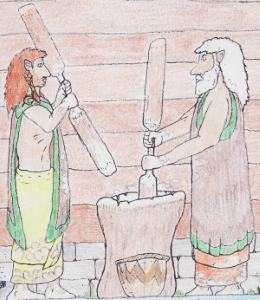
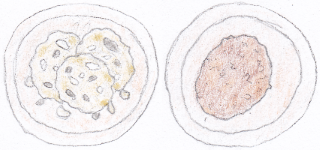

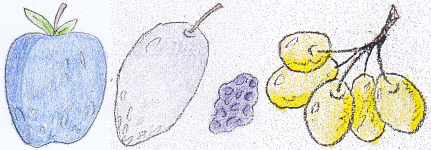


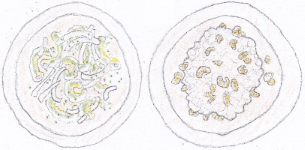
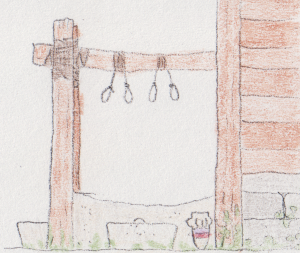

Comments